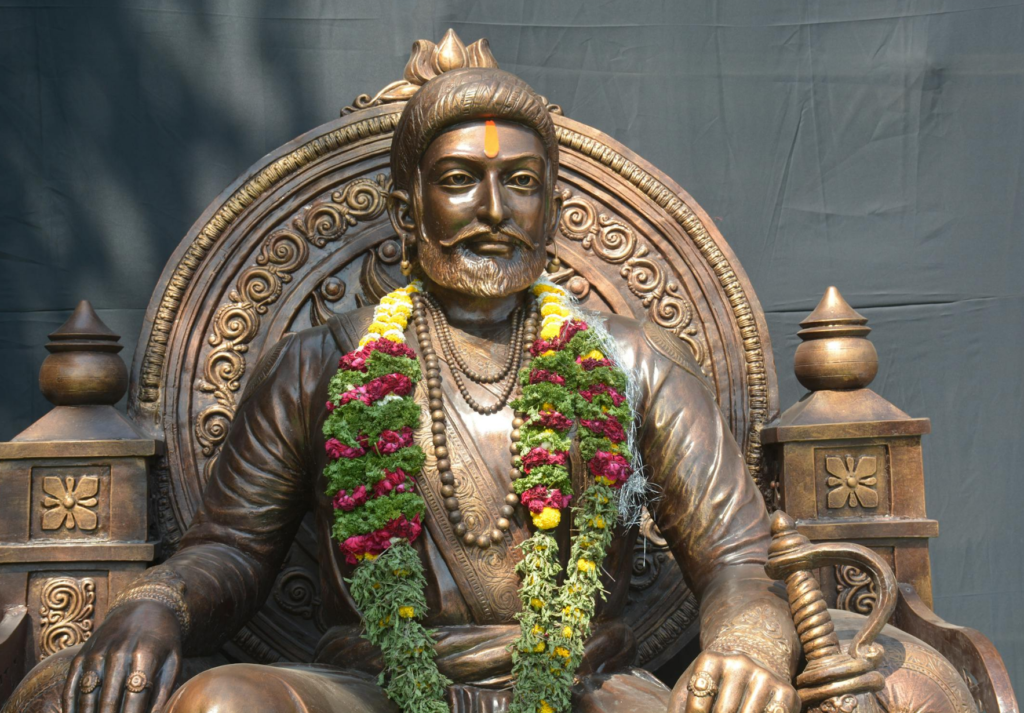8 Life Lessons From Chatrapati Shivaji Maharaj: Chatrapati Shivaji Maharaj was a revered leader in Indian history, and is known for his strategic brilliance and unwavering determination. His legacy offers valuable life lessons in courage, leadership, justice, and innovation. As we explore his remarkable life, we uncover timeless principles that continue to inspire generations worldwide.

Today, on April 3rd, we commemorate the death anniversary of the great Shivaji Maharaj. Let’s take a moment to delve into some significant aspects of his remarkable life.
Who was Chatrapati Shivaji Maharaj?
- Chatrapati Shivaji Maharaj was a revered Indian leader born on February 19, 1630, in the Shivneri Fort of Maharashtra. He was the son of Shahaji Bhonsle, a Maratha general, and Jijabai.
What were Shivaji Maharaj’s early achievements?
- At the age of 15, Shivaji Maharaj began his military campaign by capturing the Torna Fort, laying the foundation for his quest to establish a sovereign Maratha state. He strategically expanded his territory by capturing key forts and regions, including Raigad, which became the capital of his kingdom.
What were Shivaji Maharaj’s military tactics?
- Shivaji Maharaj was a master strategist who revolutionized warfare with his innovative tactics, particularly guerrilla warfare known as “Ganimi Kava” or “hit and run.” His swift raids and ambushes against larger armies allowed his smaller force to outmaneuver and defeat formidable adversaries.
How did Shivaji Maharaj reform governance?
- Shivaji Maharaj established an efficient administrative system with the Ashta Pradhan (Eight Ministers) council, each overseeing different aspects of governance such as revenue, finance, justice, and intelligence. This decentralized system ensured effective governance and fair administration throughout his empire.
- Here’s a table describing the Ashtapradhan established by Chatrapati Shivaji Maharaj:
| Minister | Portfolio | Responsibilities |
|---|---|---|
| Peshwa / Pantpradhan | Prime Minister | Chief executive, responsible for governance and administration |
| Amatya / Mazumdar | Finance Minister | Management of finances, taxation, and economic policies |
| Sacheev / Shurunavis | Secretary | Management of correspondence, record-keeping, and communication |
| Waqia-Navis / Mantri | Interior Minister | Oversight of internal affairs, law and order, and justice administration |
| Senapati / Sar-i-Naubat | Commander-in-Chief | Head of the military, responsible for defense and strategic planning |
| Sumant / Dabir | Foreign Affairs Minister | Management of foreign relations, diplomacy, and trade |
| Nyayadhish | Chief Justice | Head of the judicial system, responsible for dispensing justice fairly and impartially |
| Panditrao | High Priest | Oversight of religious and cultural affairs, preservation of traditions |
What were Shivaji Maharaj’s contributions to social welfare?
- Shivaji Maharaj implemented various social reforms aimed at improving the lives of his people. He promoted education, encouraged agriculture, and ensured equitable taxation, emphasizing the welfare of his subjects and the development of society as a whole.
How did Shivaji Maharaj promote religious tolerance?
- Despite being a devout Hindu, Shivaji Maharaj respected and protected the rights of people from all faiths. He abolished the oppressive Jaziya tax (compensation paid by non-Muslims for being spared from death or compensation for living in Muslim lands) on non-Muslims and promoted a policy of religious freedom and coexistence, fostering social harmony and unity among his subjects.
What is Shivaji Maharaj’s legacy?
- The legacy of Chatrapati Shivaji Maharaj is enduring and inspirational. His establishment of the Maratha Empire laid the foundation for Maratha dominance in India for centuries to come. His principles of administration, military strategy, and social justice continue to inspire leaders and thinkers worldwide.
8 Life Lessons We Can Learn From Chatrapati Shivaji Maharaj’s Life
Here are some life lessons we can learn from the life of Shivaji Maharaj:
- Courage and Determination: Shivaji Maharaj demonstrated immense courage and determination in the face of adversity. His unwavering commitment to his goals teaches us the importance of staying strong and resilient in challenging times.
- Leadership: Shivaji Maharaj was a visionary leader who led by example. His ability to inspire and motivate others, as well as his strategic thinking, highlight the importance of effective leadership in achieving success.
- Strategic Planning: Shivaji Maharaj was a master strategist who carefully planned his military campaigns and administrative reforms. His approach teaches us the importance of strategic thinking and planning in achieving our objectives.
- Innovation: Shivaji Maharaj was known for his innovative military tactics, such as guerrilla warfare. His ability to think outside the box and adapt to changing circumstances teaches us the importance of innovation and adaptability in overcoming challenges.
- Justice and Fairness: Shivaji Maharaj was known for his sense of justice and fairness. His commitment to upholding the rights of his subjects, regardless of their background, teaches us the importance of treating others with fairness and respect.
- Religious Tolerance: Despite being a devout Hindu, Shivaji Maharaj respected and protected the rights of people from all faiths. His policy of religious tolerance teaches us the importance of respecting diversity and fostering harmony among different communities.
- Persistence: Shivaji Maharaj faced numerous challenges and setbacks in his life, but he never gave up. His persistence teaches us the importance of staying focused and determined, even in the face of obstacles.
- Legacy: Shivaji Maharaj’s legacy continues to inspire generations of Indians. His life teaches us the importance of leaving a positive impact on the world and striving to make a difference in the lives of others.
Overall, the life of Shivaji Maharaj is a testament to the power of courage, determination, and leadership. His principles and values continue to resonate with people around the world and serve as a source of inspiration for generations to come.
